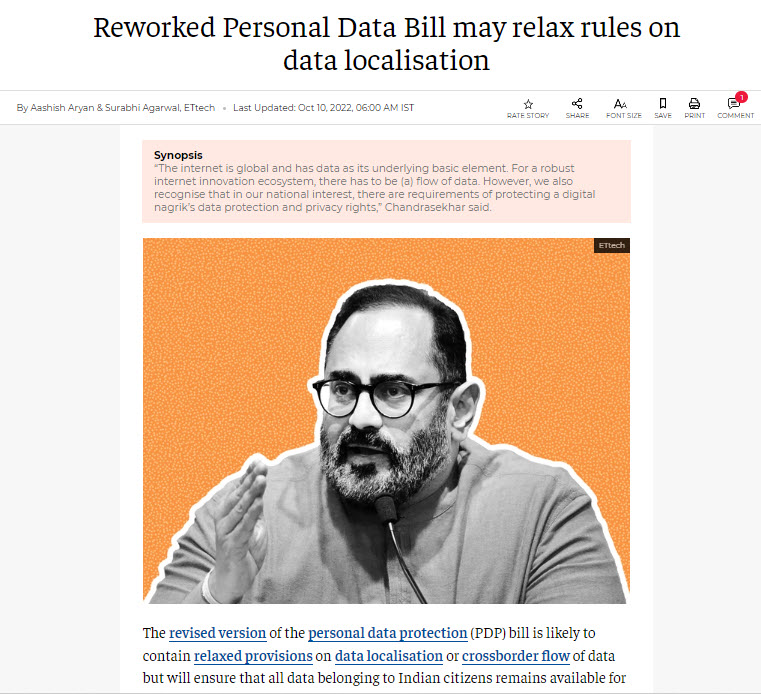WhatsApp has been in Supreme Court to test it’s Privacy Policy which it intends to impose on Indian users which is less protective of privacy compared to their EU policy and imposes the US jurisdiction on Indians. WhatsApp has also opposed the “Intermediary Guidelines” in the past about identification of originators of some offensive messages.
Recently however, WhatsApp is also reported to have deleted 23 lakh accounts in India in the month of August in compliance with the new IT rules 2021. A similar number of accounts were also reportedly deleted in the previous month. With the total number of nearly 500 million users, the monthly deletion comes to about 0.5%. Most of these deletions could also be due to the detection of robotic fake accounts and also because of specific complaints where by some groups might have been deleted with all the accounts of their members.
In this frequent series of skirmishes between WhatsApp and the Government, the new frontier now is the draft Telecom bill
Now looking at the Draft Telecom Bill available for public comments, one most debated clause is the inclusion of OTT and Messaging platforms in the definition of Telecommunication Services/Service Providers.
The draft Bill defines telecom services as follows:
“telecommunication services” means service of any description (including broadcasting services, electronic mail, voice mail, voice, video and data communication services, audiotex services, videotex services, fixed and mobile services, internet and broadband services, satellite based communication services, internet based communication services, in-flight and maritime connectivity services, interpersonal communications services, machine to machine communication services, over-the-top (OTT) communication services which is made available to users by telecommunication, and includes any other service that the Central Government may notify to be telecommunication services;
An interesting provision that adds to the above is that
“Any entity which is granted a license under sub-clause (2) of Section 3, shall unequivocally identify the person to whom it provides services, through a verifiable mode of identification as may be prescribed.”
“The identity of a person sending a message using telecommunication services shall be available to the user receiving such message, in such form as may be prescribed, unless specified otherwise by the Central Government.”
We suppose the Government may exempt organizations below a particular size in terms of turn over or number of subscribers on the lines of the definition of ” Significant Social Media Intermediaries” used in ITA 2000, from the provisions of licensing and some of the regulations.
But WhatsApp as well as G Mail will come under these provisions and will need to hold the information on the real identity of the subscriber and display it to the receiver (automatically or on request) like the “Caller ID Display” in mobile communication.
While these provisions are a strong measure to tackle “Spam” and “Phishing” they may be opposed by the Big Tech Companies.
We expect that along with the debate on WhatsApp privacy Policy these aspects of jurisdiction of India on WhatsApp and the need for compliance by these organizations of Indian Laws will be discussed in the Supreme Court .
Firing it’s salvo on these provisions, Wire.in carries an article tiltled “How the draft Telecom Bill Institutionalises Big Brother’s Saffron Tick”.
Taking the line of argument popular with criminals and terrorists, Wire.in comments
“..the government has assumed powers that it never had under any law, and is trying to use legislation to force OTT messaging services, many of which are end-to-end encrypted, to make a backdoor.”
“A key test that courts have articulated for assessing the reasonableness of state action (including legislation) that seeks to engage or restrict fundamental rights is that the measure must be “necessary in a democratic society”. The powers under Clause 24 of the Bill of blocking, interception, decryption and disclosure of private communications and correspondence do away with this requirement of ‘necessity’ as they can also be exercised on the ground of ‘expediency’.”
While the concern expressed by the criminal friendly media is understood and appreciated, it is to remembered that the protection under the laws such as the “Right to Privacy” should not be guaranteed for Criminals because it interferes with the “Right to Security” of another law abiding citizen.
Irrespective of how Supreme Court might have interpreted the law in the past, the security situation in the country is not the same today as it was in 1989 when Rangarajan V Jagjivan Ram (quoted by Wire.in) decision was given or even when the Puttaswamy Judgement was delivered in 2017.
Today the Supreme Court has to factor in the existential threat to the Indian Society posed by fundamentalists and “Privacy” is the tool with which they hide and hit back. If the intelligence agencies donot crack this “Weil of Privacy” the country may not exist in 2047 to uphold the “Right to Privacy”.
Hence the law and it’s interpretation has to be dynamic and move with the times. Supreme Court also has to forget the old cases as they did by over ruling M P Sharma Judgement by Puttawamy Judgement and hold that the provisions contemplated in laws such as the Telecom Bill or the CERT In Guidelines etc are reasonable and proportional to the risks which the Government of the day is duty bound to provide to its citizens.
The undersigned has factored this into his recommendations on the new Data Protection Act in the articles under the series of “Shape of Things to Come”.
The proposed approach is
a) To define Right to Privacy as a Right guaranteed by the Constitution not available to criminals of certain description.
b) To specifically enable the Government to remove the weil of secrecy by mandating that “Anonymization” has to be regulated.
Accordingly, “Protected Right” was recommended to be defined as
Protected Right
The right to privacy of an Indian Citizen shall pe protected through due process set by this Act as an intrinsic part of the right to life and personal liberty as envisaged under Article 21 and as a part of the freedoms guaranteed by Part III of the Constitution of India subject to reasonable exceptions under article 19(2) of the Constitution of India.
Also set obligations of the Government as follows:
Obligations of the Government
(a) All the Government bodies including the Government of India the Governments in States and Union Territories and every organization which is part of such Government or Union Territory shall have the duty to protect the Right to privacy of Indian Citizens in harmony with the Right to protect the life and liberty as envisaged in the Constitution of India
(b) All such Government bodies shall institute reasonable and proportionate measures to meet the obligations of protecting such Rights.
(c) All such Government bodies shall designate a senior official to be responsible for compliance of the protection of the Right to Privacy and Right to life, property and liberty
(d) In the event of non compliance of the above, the designated person or in his absence the person responsible for the activities in the subject Government body shall be liable for disciplinary action
(e) If the non compliance is associated with malicious intention, the person responsible may be liable for punishment under appropriate criminal law.
The definition of Privacy is suggested as follows:
Privacy:
1.“Privacy is a fundamental right under the Constitution of India as an independent right under the Right to life and liberty that guarantees an individual that shall not be infringed except under due process of law as defined in this Act and includes the following.
(a) “Physical Privacy” means the choice of an individual to determine to what extent the individual may chose to share his physical space with others.
(b) “Mental Privacy” means the choice of an individual to determine to what extent the individual may chose to share his mind space with others
(c) “Neuro Privacy” means the choice of an individual to determine to what extent the individual may share his neuro space with others
(d) “Information Privacy” means the expression in electronic form of the choice of an individual to determine to what extent the individual may share data about the individual with others.
Explanation:
“Sharing” in the context above means “making the information available to another human being in such form that it can be experienced by the receiver through any of the senses of seeing, hearing, touching, smelling or tasting of a human in such a manner that the identity of the individual to whom the data belongs may become recognizable to the receiver with ordinary efforts”.
2. The Right to Privacy referred to in this section is subject to the reasonable restrictions in the interest of sovereignty and integrity of India, the security of the State, friendly relations with foreign States or public order; and for preventing incitement to the commission of any cognizable offence relating to sovereignty and integrity of India, the security of the State, friendly relations with foreign States or public order,
Under this approach, “Right to Protect the Life and Liberty” does not apply only to the subject individual whose “Right to Privacy” is under discussion. It also extends to the 130 crore other individuals whose rights of security is to be protected against the right to privacy of the one criminal.
The Supreme Court also has to understand and appreciate that while they glorify the application of human rights to all criminals and terrorists, whenever the Court leans in favour of a criminal on any pretext, they are betraying the interests of the larger majority of honest citizens. If the Court goes for minority appeasement like the political leaders, the honest citizens will lose faith in the Judiciary.
I suppose that the manner in which the Supreme Court will dispose off the WhatsApp petition in January 2023 will determine whether the Court appreciates the larger public good or respects the duty of the Government to protect honest citizens.
Naavi















